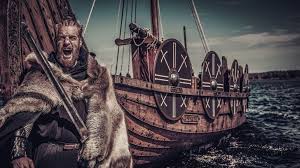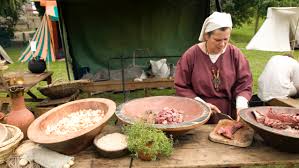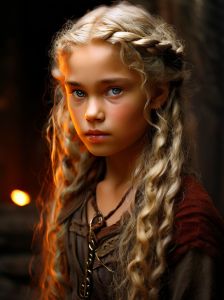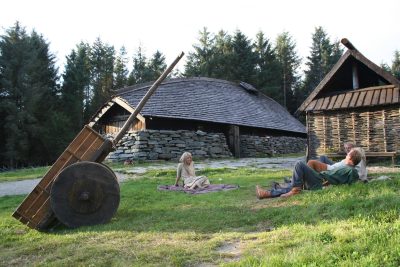Kirstie was raised in a well-to-do situation in a house situated on a fine piece of property connected to the village of Strindlos in Trondelag on the Trondhjemsfjord. Strindlos meant loose thread. Located south of Varnes and Oglo (igloo) and across the fjord from the Frosta peninsula that Kirstie called Frosta the Snowman when she turned five, Strindlos was not exactly on the main trading route. Most trading ships stopped in the town that would become Trondheim, where the king’s lodge was located, or went further up the fjord to some bigger villages in the north. Strindlos, along with Varnes, the village on the Varnes River, required a side trip down a branch off the main fjord. People needed a reason to go there.
All the same, they lived well. Kirstie’s and her family had three men and one woman in the house who were thralls, which is slaves. They worked the land and kept the house and farm in good condition. That was especially necessary when Kirstie’s father went to sea to explore, trade, or raid. The thralls were well fed, clothed, housed, and treated almost like family, so they had no complaints. Kirstie never really thought of them as slaves. She called them farmhands, and when she turned six, she called them the scarecrow, the tin man, and the cowardly lion, even if she had no idea where those thoughts came from. The woman she called Dorothy, though it was not her name. At least she was able to name her puppy Toto, and she would not be talked out of it.
They had cows for milk, fowl for eggs, and pigs that ate all their garbage and spoiled leftovers, and eventually made bacon and sausage. For supper, they mostly ate fish of one kind or another that they picked up in the market, though they had good hunting in the forest, so they hardly had to eat fish every evening. They also had good fields to grow their grain and some cash crops they could sell in the market. And they grew their own vegetables and picked the fruit from the trees and bushes in season. Mama ran the farm, especially when Papa went to sea. But it was a good life, even if Strindlos did not get much in the way of fancy trade goods.
One thing Strindlos did have was a good forest and good lumber with which to build the longships and trading ships the people were famous for. Several shipwrights lived in the village, and by the time Kirstie was born, they had stripped the forest back nearly a quarter mile and created what they called the long field. The forest itself appeared endless, stretching all the way up into the mountains. Of course, no one thought about conservation back then. They just used whatever came to hand.
 Because of the ship building and the ship repairs in an easily accessible dry dock, the village did get some traffic. They also built ships for the village men to go and get their own trade goods. When Kirstie was a child, they had three longship captains in the village. One never returned. Another ship returned, but under the guidance of Kirstie’s father. He was an excellent navigator, and if not a ship captain, he was the next best thing. The third captain, Kerga, eventually became the village chief. He was a hard man, not one to put up with any nonsense, but he willingly listened to what people had to say and was not against taking good advice.
Because of the ship building and the ship repairs in an easily accessible dry dock, the village did get some traffic. They also built ships for the village men to go and get their own trade goods. When Kirstie was a child, they had three longship captains in the village. One never returned. Another ship returned, but under the guidance of Kirstie’s father. He was an excellent navigator, and if not a ship captain, he was the next best thing. The third captain, Kerga, eventually became the village chief. He was a hard man, not one to put up with any nonsense, but he willingly listened to what people had to say and was not against taking good advice.
When Kirstie was grown, there were four captains, old man Harrold, Jarl the Younger, Rune Stenson, and Kare Bronson who married Kirstie whether she liked it or not; but that occurred later on. First there were the ordinary and strange events.
~~~*~~~
Kirstie, Hilda, and Liv were in the village market one day looking for something special to celebrate Hilda’s twelfth birthday. Kirstie was ten. Liv just turned eight.
“I know. We should get some sweet sausages,” Kirstie suggested. “That is what Greta liked for her birthday.”
“Your invisible friend, Greta had a birthday?” Liv asked and smiled. Everyone supposed Greta was Kirstie’s imaginary friend, but the way Kirstie talked about her, Hilda was not so sure. She also wondered if there was more to it.
“What about Yasmina?” Some were concerned, not that young Kirstie had an imaginary friend, but that she had more than one.
Kirstie shook her head. “She eats things like goat and sometimes camel, and they are always very spicy.”
“So, Yasmina has birthdays too,” Liv said, and tried to sound serious, not scoffing. “So, how old is Yasmina?”
“She is my age. She is ten.”
“Of course. And Greta?”
Kirstie curled her lip and moved in close to whisper. “She died about seven hundred years ago. I remember.”
“But she had birthdays?” Hilda asked.
“Of course. She had many birthdays. When Greta got older, she liked lamb, or beef stew, but when she was young, she especially liked the sweet sausages.” Kirstie dragged Hilda to the table where the meat was set out to buy. Liv followed. They had to wait. Old lady Sif was there delivering the latest gossip to Frida, the meat vendor. Frida showed a frown on her face but said little as Lady Sif tended to babble.
 “I tell you the Stenson farm was attacked not two nights ago. Rune is at sea, you know. Sigrid barely got her children out in time. The house and barn were burned to the ground, and all the livestock was stolen.”
“I tell you the Stenson farm was attacked not two nights ago. Rune is at sea, you know. Sigrid barely got her children out in time. The house and barn were burned to the ground, and all the livestock was stolen.”
“Who would do such a thing?”
“They say the Vanlil have come down from the mountains. They say old Chief Knud Lefthand is leading them. Gertrude by the Varnes says she saw him on a ridge leading a dozen men in arms either hunting or scouting, though her husband is not sure. He says it might have been the chief. What are we going to do? So many men are at sea. We only have the old men and boys to defend our homes.”
“Vanlil?” Hilda interrupted the woman to ask. “Who are they?”
“Vanlille,” Frida explained like to a child. “The little Vanir. They are the people of the mountains who do not know the sea or how to sail on it. They live in Jamtaland over the mountains…”
“Little Vanir?”
Frida nodded, but Inga arrived. She ran to join them. She looked at Kirstie like she had something important to say or do, but she heard the question, and Frida looked to the Volve in training to answer the question. Even old lady Sif kept her mouth shut to hear what Inga had to say. Inga glanced at Kirstie once more before she took a deep breath.
“The Vanlil are the old people who first came into the mountains in the days of water and ice, long before our ancestors came to this place. Some say they were driven into the mountains when the Aesirs and Vanir were at war. That was long, long ago. The Vanlil know the Aesir, but they worship the Vanir we know as Fryer of the sun, his sister Fryja of love and war, and their father Njord of the sea, with others. The odd thing about the worship of Njord is Jamtaland is landlocked. They have no access to the sea.”
“But it was not always so,” Kirstie said softly, and Inga nodded and continued.
“The gods of the Vanir are the Vanstor, and the people are the Vanlil. When the waters pulled back into the sea and the ice giants returned to the north, the Vanlil moved to the east, down into the hills, forests, and fields of Jamtaland. They have a few towns, or permanent villages where they grow their grain and keep their animals, but mostly they move about and hunt. For us, the rite of passage for young men is to be in battle, to kill an enemy. For the Vanlil, I heard the rite of passage is to kill the moose. I do not know that for certain.”
“But why would they leave their homes and come over the mountains to attack us?” old Lady Sif whined.
“You said it yourself,” Frida answered her. “They are being led by Knud Lefthand and probably the other chiefs and men who fled when King Harald Fairhair came to claim the great fjord of Trondelag, and all the people around.”
Inga and Kirstie both shook their heads, and it raised Hilda’s eyebrows, but her mouth stayed closed.
“That does not explain why the Vanlil should fight and maybe die for a people not their own,” Inga said, and turned her head to look directly at Kirstie. This was no glance. This got every head to turn to Kirstie. Just like Inga, Kirstie had to take a deep breath before speaking.
 “There is another power driving them. Knud and the former men and chiefs of the Trondelag may themselves be pawns in the game, though they have been quick to take advantage of so many willing fighters.”
“There is another power driving them. Knud and the former men and chiefs of the Trondelag may themselves be pawns in the game, though they have been quick to take advantage of so many willing fighters.”
“What?” Liv scoffed in her best preteen voice. “Is this something you dreamed or just something you imagined?”
“But what is to be gained by attacking us?” Lady Sif could not hold it in. “We are a small, insignificant village off a branch of a branch of the sea.”
“We are not the target,” Kirstie said and looked at Liv, Hilda, and the women. She spoke when her eyes landed on Inga. “My guess would be they are gathering to fall on Hladir, the king’s place, and the town that built up beside it at the delta of the Nid River. From there they can easily cross the fjord, assault, and take Stadr, to control the narrow place and access to the sea. Then, I imagine they expect all the chiefs north and throughout the Trondelag will come over to their side. After that, it should be easy enough to push to the sea, if they are not invited. The people have had eighteen years of Harald Fairhair lording it over them, and some are not happy. I imagine Knud and whoever is with him believe now is the time to strike.”
They all paused to watch old Chief Birger and several old men trudge past them, headed for the big house, the Storthus, the place of meeting. Inga grabbed Kirstie’s wrist so she could not escape. She turned to Hilda and Liv. “Go home and make sure your family is safe.”
“Happy birthday,” Kirstie managed to say.
“Yes,” Inga agreed. “Happy birthday,” she said before she dragged Kirstie off after the men.
